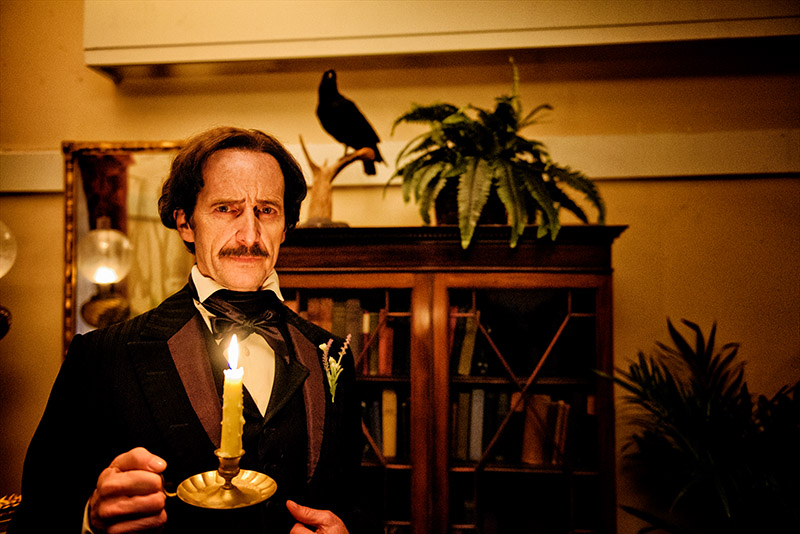
Just in time for Halloween comes Aquinnah seasonal resident Eric Stange’s documentary “Edgar Allan Poe: Buried Alive.” Stange wrote and directed the project, which was, all in all, almost 10 years in the making. The film, part of the PBS “American Masters” series, airs on Monday, Oct. 30, at 9 pm.
Anyone who’s taken a high school English class surely remembers Poe’s “Once upon a midnight dreary, while I pondered weak and weary …” Stange’s film acknowledges the quintessential dark eeriness of his subject, but sheds light on Poe’s other accomplishments — among them his pioneering work that delves into the psychological recesses of consciousness.
Stange said he didn’t set out to make the documentary, and had no real passion for Poe. A Baltimore devotee of the author, Wally Coberg, contacted Stange about making the film back in 2007. Coberg was a retired set designer living off his Social Security payments, Stange said. The two men kept talking, and eventually Coberg applied for a grant to get the project off the ground. Unfortunately, Stange said, Coberg died before “Buried Alive” was completed.
“It was his life’s passion,” Stange told The Times in a telephone interview. “We dedicated the documentary to him.”
Stange said he couldn’t put the project down at that point, and he came to appreciate Poe the further he went into research about the writer’s life.
“The more I learned about Poe, the more I began to realize there’s a lot more there,” Stange said. “The intention was to set the record straight and try to get to the real Edgar Allan Poe.”
The 19th-century author cultivated the dark personality he is remembered for, Stange said, because he knew he could sell more stories that way. What Poe likely didn’t want, he said, was to be memorialized as a delirious opium addict. “Completely false,” Stange said.
The depiction of Poe as a somewhat deranged and creepy character with an appetite for alcohol and drugs was perpetuated, the film notes, by one of Poe’s rival literary critics, Rufus Wilmot Griswold. “Buried Alive” notes that critics of the day rarely wrote a disparaging word about the works they reviewed. Poe was different. He held nothing back in his observations. Griswold, however, was what was referred to as a “puff” critic, and took a tit-for-tat approach. He would write a positive review, and the author would do something for him. Upon Poe’s death at age 40, Griswold wrote the first and most infamous obituary, which begins, “Edgar Allan Poe is dead. He died in Baltimore the day before yesterday. This announcement will startle many, but few will be grieved by it.”
In “Buried Alive,” Stange provides a context that offers a clearer lens with which to look at the author’s writing and his life. “In the 1840s, there was financial panic, immigrants arriving, tenements built in urban areas, epidemics,” Stange said. It was a time when death and tragedy were familiar to most everyone, so Poe’s writing was not so out-of-the-box as it might seem.
Stange manages to blend both the recitation of some of Poe’s ghostly poetry with his legitimate career as a literary critic and magazine editor in the documentary.
“He’s an important figure in American literature,” Stange said. “Everyone recognizes his portrait. How many 19th-century writers can you say that about? He’s so well known, yet so misunderstood.”
Poe’s life was filled with grief; his mother, foster mother, and his much younger wife all died before him. He often struggled financially, and, according to the documentary, he did have an unhealthy relationship with alcohol. But what the film leaves the viewer with is that, as is nearly always the case, he wasn’t all bad. On the contrary, the documentary shines a starry light on Poe, letting the viewer in on less-known aspects of his life. He was a groundbreaking literary figure who gave us the first detective stories, and was a master at keeping his readers riveted to the story.
“My hope is that people go back and read Poe again,” Stange said. “So many read him as a teenager, but when you read him as an adult, you realize there are many more layers than you realized. For decades he was a weird sideshow in American literature, but looking back on his role, we see he was a short story writer, a poet, a critic, and an important pioneer in delving into the psychological side of human existence.”
“Edgar Allan Poe: Buried Alive” stars Tony award-winning actor Denis O’Hare, a familiar face for those who watch “American Horror Story.” Husky-voiced actress Kathleen Turner narrates.
This story by Connie Berry originally appeared at mvtimes.com.



